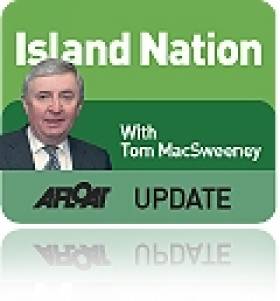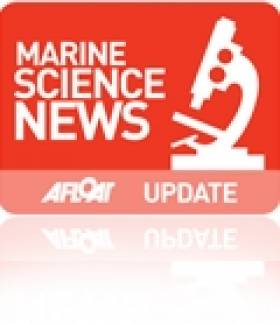Displaying items by tag: central bank
Why Does The Central Bank Not Recognise Marine?
#islandnation – Having written last week about the lack of national recognition for our maritime heritage I received a press release about the Central Bank honouring John Philip Holland, the Irish inventor of the submarine.
I am pleased to see that the Central Bank has taken such a step but, perusing the media releaseon the Central Bank website, I noted the quote from the Central Bank’s Director of Currency and Facilities Management, Paul Molumby: “This is the first in a new series that the Central Bank will issue to honour Ireland’s impressive scientific and technological tradition.”
Not a single reference by the Central Bank to the great maritime tradition of Ireland in launching the coin about an invention, fundamental to which was the marine sphere.
Mr.Molumby is quoted further as saying that “John Philip Holland’s life and achievements were extraordinary. He played a significant role in the development of submarine navigation and following his emigration to the USA, he designed the first working submarine.”
Indeed, he did, but Mr.Molumby and the Central Bank omitted mention of the marine in the technological development they were honouring.
At least the Bank went to the Marine Institute in Galway to launch the coin.
The Institute issued a press release with the same quotation, but Dr. Peter Heffernan, the Institute’s CEO, did mention at the launch that Ireland has “a strong tradition of innovation and we at the Marine Institute are very proud to maintain that link with the history of marine technology. We named our remote operated vehicle (ROV) after John Philip Holland.”
This ROV honours the legacy of a man who used the maritime sphere for innovation, but the Central Bank in honouring him do not even use the word ‘marine.’
The Marine Institute is using the ROV on surveysof mid-Atlantic volcanic vent fields and new animal communities on the deep canyons of our Continental slope, as well as working on crucial fisheries, environmental and climate changes and assisting in the development of new marine sensor technologies.
The Central Bank is charging €44 for the €15 coin according to the press release.
Am I being tendentious in making this point?
Perhaps, but where there is neglect of the maritime sphere at the highest levels, it should be challenged and the more it is, the more those disregarding our maritime traditions and potential will be forced to change their attitude.
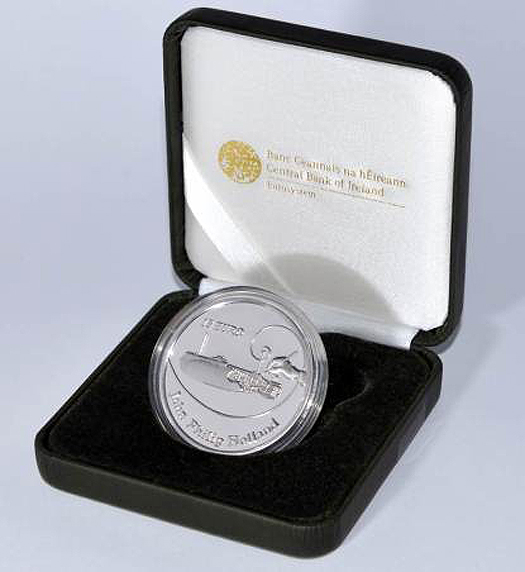
While the issuing of the coin (pictured above) is welcome, I respectfully suggest to the Central Bank that it acknowledge the maritime sphere and note that Holland’s invention relied fundamentally on the marine.
FISH GUTS AND DIESEL AND THE RESTLESS SEA
Have you ever wondered what it’s like to be a fisherman? With Autumn having arrived and Winter not far behind, life on the ocean wave can be tough, rolling and plunging as the boat hits heavy seas while fishermen struggle with lowering and hauling of nets to catch the fish which we can eat in more pleasant surroundings.
Paul McDonald is a songwriter who wrote much of his work in the heart of Dublin, where he had a cottage in Copper Alley. But he also had experience as a fisherman out of Galway. The song, “Fish Guts and Diesel,” on his CD ‘Crazy Old World’ tells his story of life aboard a trawler many miles out to sea off the West Coast – on the Porcupine Bank. You can hear it on this month’s edition of THIS ISLAND NATION (above), my monthly maritime radio programme that is broadcast on a number of community radio stations.
“As long as I live I’ll never forget the smell of that combination of fish guts and diesel,” he said.
There are some beautiful lines in the song which anyone who has kept a night watch at sea will empathise with:
“Sometimes in the dark as you gaze in the night,
Your mind’s in the stars as your thoughts they take flight
And then a Force Seven brings you back down to earth
And you battle the elements for all that your worth.”
You can hear the song at the start of this month’s programme. As I broadcast it, I could almost see those dead fish eyes which he sings about, staring up at me from the catch hauled aboard. Having been on a few trawlers in my time, occasionally in not-too-pleasant conditions and even though I sail and have sailed in rough weather, I admire hugely those fishermen whose stomachs, I think, must be made of cast-iron to withstand the conditions in which they have to work. I think anyone with an interest in the sea will like the song.
FOREIGN BOATS COST IRELAND OVER A BILLION EUROS
Incidentally, the huge value of fish caught in Irish waters by fleets from France, Spain, Portugal, Holland and the UK, is shown by the figures which the Department of Agriculture, Food and the Marine has released for catches taken last year from around Ireland. The total value was €1.16 billion. That would be hugely valuable to this nation’s economy, but regrettably Ireland’s share of this catch was only 17 per cent in value. The total catch taken from Irish waters 1,040,117 tonnes, but Irish boats were allowed by EU regulations to catch only 23 per cent of this tonnage. These figures prove just how much the EU gets in monetary value from Ireland. Little is heard about this from economic commentators or politicians who tell us how grateful we should be to the EU, but the reality is that the EU gets a lot of money from Irish waters. Our fishing industry, rather than shrinking in size, should be much bigger, with economic and employment benefit, if the riches of Irish waters had not been given away by Irish governments .Tellingly, the summary line in the figures compiled by the Department says that the economic value of €1.16 billion which they quote for fish caught in Irish waters “… represents a conservative estimate.”
BROADCASTING FROM THE COASTLINE
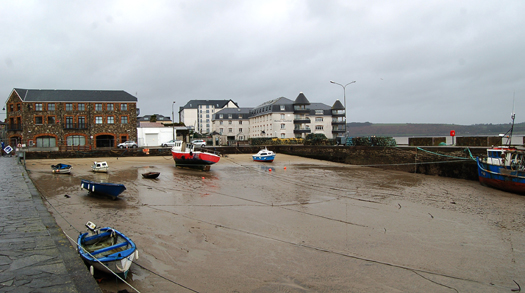
Youghal seafront
THIS ISLAND NATION is broadcast from the studios of Community Radio Youghal on the coastline of East Cork and the banks of the River Blackwater. I mention on the programme W.M.Nixon’s story about the GP 14 sail up the Blackwater from Youghal, which was reported on Afloat last week. This has raised interest in the sport. The Kathleen and May will be remembered as the great schooner which linked Youghal with the UK and there are many other stories of Youghal seafarers in a town with a great maritime tradition.
Next month, following listener interest, the programme will increase its slot from monthly to fortnightly.
SEAWEED IS NOT JUST A WEED
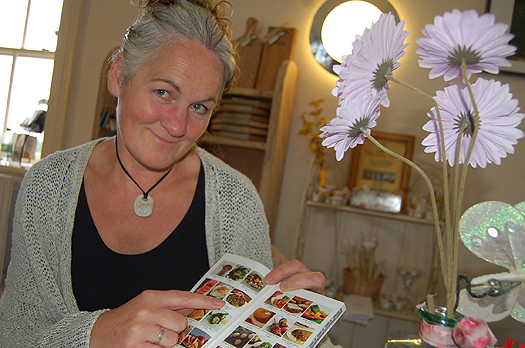
Also on this month’s programme I talk to The Sea Gardener, Marie Power (pictured above), in Tramore. She grew up on what’s known as The Copper Coast of County Waterford, a fascinating part of the countryside and has been running seaweed workshops for several years on a voluntary basis, even though her professional background is in management and training consultancy. Seaweed is not just a weed she says – and she is very definite about that. Listen to hear more.
HALF THE COUNTER IS FARMED
Nearly half of the fish which the public sees on fishmonger’s counters has been farmed. So Richie Flynn, IFA Aquaculture Executive, told me when I interviewed him. “This is something which should be encouraged for the future of coastal communities right around the coast,” he said, but added that the Government’s attitude towards licensing “is still a problem for aquaculture development.”
Email: [email protected]
Twitter: @Tom MacSweeney
Central Bank Issues Commemorative Coin in honour of Irish Submarine Inventor John Philip Holland
#submarine – The Central Bank of Ireland launched today a €15 limited edition Silver Proof collector coin to commemorate John Philip Holland [1841 - 1914], the Irish born inventor of the modern submarine.
Speaking at the launch at the Marine Institute, Oranmore, Galway, Central Bank Director of Currency and Facilities Management, Paul Molumby said: "This is the first in a new series that the Central Bank will issue to honour Ireland's impressive scientific and technological tradition. John Philip Holland's life and achievements were extraordinary. He played a significant role in the development of submarine navigation and following his emigration to the USA, he designed the first working submarine."
Dr Peter Heffernan, CEO Marine Institute said: "We're delighted to host the launch of the Central Bank's commemorative coin here today to honour John Philip Holland, the Irish born inventor of modern submarine. As a nation we have a strong tradition of innovation and we at the Marine Institute are very proud to maintain that link with the history of marine technology - we named our remote operated vehicle (ROV) after John Philip Holland the Irish born inventor of modern submarine.
With the ROV Holland I, we honour his legacy through important recent scientific discoveries such as the surveys of mid-Atlantic volcanic vent fields and the unique new animal communities on the deep canyons on our continental slope, as well as working on crucial fisheries, environmental and climate changes missions and assisting in the development of new marine sensor technologies.
This event would have also been well received by the late Commander Bill King who lived in Oranmore, Galway. Commander King had commanded the submarine Snapper during World War II, in which he won the DSO and DSC while patrolling the coast of Norway. In his later years he frequently addressed meetings urging people to seek adventure in their lives, particularly having joined the Royal Navy at a young age of 13.
The coin features a representative image of the inventor's hand poised to place the final stroke of a technical drawing of the USS Holland, complete with a decorative nautilus spiral with the obverse bearing the traditional representation of the Irish harp. The coin, which was designed by Mary Gregoriy, is part of the Irish Science and Inventions coin series, and has an issue limit of 10,000 units.
The Holland coin will be available to the public from Tuesday 2nd September 2014. Coins can be purchased by downloading an order form from www.centralbank.ie, by phoning 1890 307 607 or directly from the Central Bank on Dame Street in Dublin at a cost of €44.



























